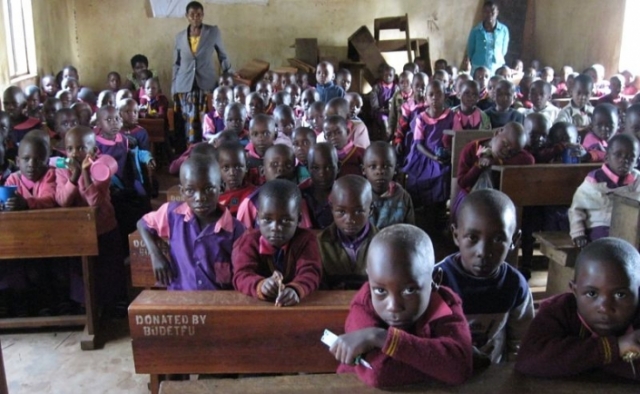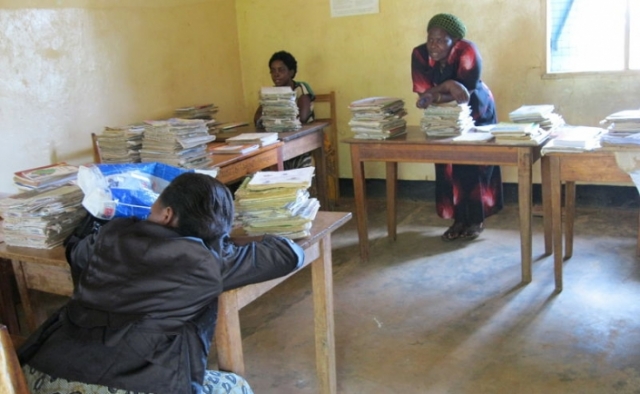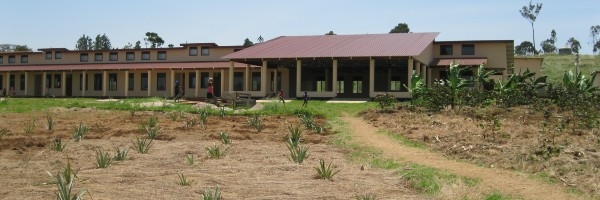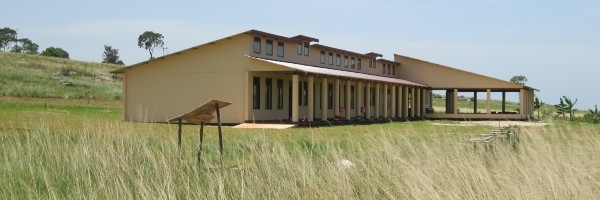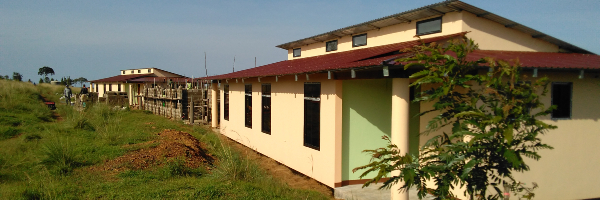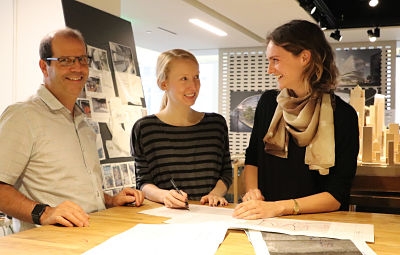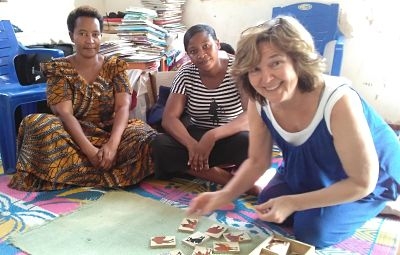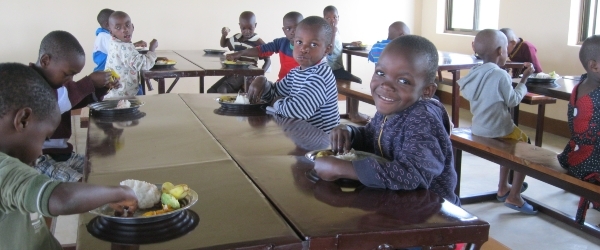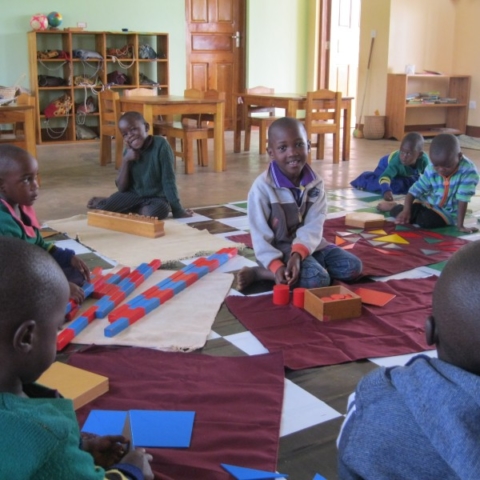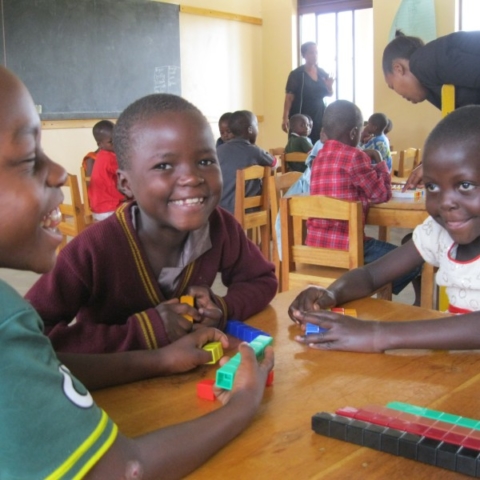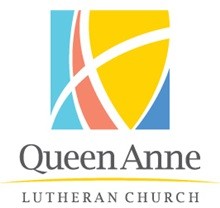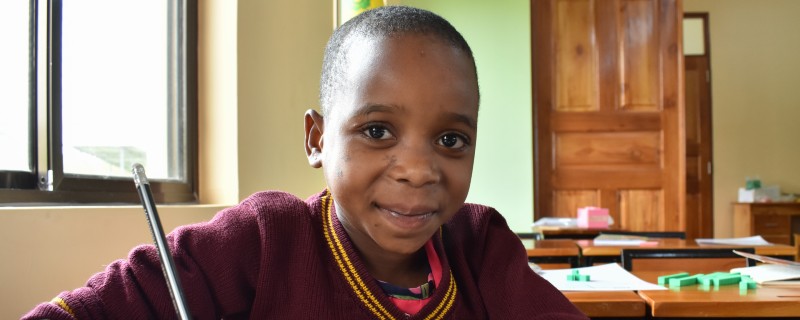
Jeannette and Michael Banobi, members of Queen Anne Lutheran Church, have created a nonprofit organization working to give children in rural Tanzania a chance to get a quality education—CORE Tanzania. Their first step was to build and operate a new primary school in Bushasha village.
If you’d like to know more about CORE Tanzania and the most recent updates at Twegashe School, you can visit their website at www.coretanzania.org.
What follows is an overview of the project from August, 2022:
Searching for new ways to help a troubled world? We invite you to join hands with CORE Tanzania as we work to open up a new future for children in rural Tanzania whose potential is being wasted because they lack access to a meaningful education.
CORE Tanzania’s founder, Michael Banobi, experienced the problem of educational access first-hand as a child growing up in the village of Bushasha in rural northwestern Tanzania. On a 2015 visit back to his village, he was disappointed to discover that over so many years the situation had not improved. The government primary school (and until now the only school) in Bushasha had an average of 88 students per class, all taught by a single teacher. The second and third grade classes each had more than 100 students. Children were packed shoulder-to shoulder at their desks, sharing usually two or three students to a textbook, and there were no visual aids other than a few tattered newsprint charts. When asked how they manage to teach under such conditions, one teacher’s reply was “We can’t do these kids justice.” Not surprisingly, students are poorly prepared for secondary school, and many drop out.
Talks with villagers led to the conclusion that a new primary school was needed in the village. Villagers suggested a school that would use English as the language of instruction to prepare children properly for secondary school, where instruction switches to English after being conducted entirely in Swahili in public primary schools. In 2018 the village demonstrated their commitment by donating 15 acres of land for the site of the new school.
Michael returned to the US and gathered a group of friends who shared his passion about the importance of education. Together, they formed a new 501(c)(3) nonprofit organization, CORE Tanzania, with a mission to increase access to quality education in rural Tanzania. CORE Tanzania began working toward this mission with a project to build and operate a new school, Twegashe Primary School, in Bushasha Village. Twegashe translates as “Let’s make our lives meaningful” in the local Kihaya language. The new school is now providing a high-quality, participatory education with classes taught in English to give children more chance of success in secondary school. All village children are eligible for admission, and there are no required fees. For more-detailed information about CORE Tanzania and Twegashe School, and to meet some of the children who are the inspiration behind our work, we invite you to explore the rest of our website.
Through the generosity of more than 250 individual donors, CORE Tanzania raised funds to construct the first phase (K-3) of Twegashe School. Phase 1 included four classrooms, teacher offices, a water well, a kitchen to prepare nutritious meals for students from the school garden, a cafeteria which doubles as an auditorium for arts performances and community activities, and teacher housing to attract talented teachers to this rural area.
An enthusiastic and highly-skilled group of volunteers contributed to this effort. A team from Gensler produced the architectural drawings, volunteers from the engineering firm Swenson Say Faget provided the structural analysis, a Seattle builder closed his business for five months to travel to Tanzania and supervise construction, and a former Montessori school owner donated all her materials and spent six weeks in Tanzania training Twegashe’s locally-hired kindergarten teachers in how to use those materials. Founder and board president Michael Banobi has spent the bulk of his time since May 2019 in Bushasha overseeing the project.
Twegashe School opened for the first kindergarten class in February 2020. Every year a new class of 30 kindergartners is added. We are currently at grade two, with a total of 90 students. In April 2022 we began construction on Phase 2 of the school, with five more classrooms, a library, administration block, and additional teacher housing. This new phase will allow Twegashe School to expand through grade 7 (the last year of primary school in Tanzania) and to add a pre-K class so our students will be ready to learn when they start kindergarten.
We are now just over halfway to our Phase 2 fundraising goal for construction plus three additional years of operation. We’re confident we will reach this goal with the help of our many committed donors. The village is showing their commitment as well – in April they voted to donate an additional 30 acres to Twegashe School so there will be room to expand and to grow more food for student meals.
We don’t have any statistics yet to show that Twegashe students are learning, but we get lots of reports from grateful parents. Elida’s father is a fisherman, and he said that when he gets up at 4am to go to the lake, Elida is often awake, too, asking if she can go to school early because she likes it so much. He was full of appreciation that his child can attend a school where she actually enjoys going to school! Everyday at Twegashe the smiling faces we see and the chatter in English that we hear tell us that kids are learning, and learning to love school at the same time.
No doubt you believe, as we do, that all children, no matter how poor, deserve this kind of quality education. We would love for you to join us as we work to put this belief into action!
April 2021 Update
There are lots of fun and exciting things happening these days at Twegashe School. Last year’s kindergartners are now in first grade, and we’ve got a whole batch of new kindergartners. During spring break our teachers will be heading to Arusha for a week-long training on student-centered teaching methods. The solar power system funded by Rotary has been installed, and the first phase of construction is complete except for finishing touches on the third teacher duplex.
Building Support, Building Relationships
Another exciting development is that we’ve started a sponsorship program. So far, we have sponsors for 14 of Twegashe’s first grade students. You can learn more about sponsorship on our website: (https://coretanzania.org/sponsor-a-child/)
Raymond is one of the first-graders who has been sponsored. He’s very excited to be drawing a picture and writing a letter to his sponsor.
We need your help so that all Twegashe’s first graders can experience this kind of excitement. Even if you can’t sponsor, we would love for you to sign up as a “pen pal” to exchange communication with one of the students who doesn’t yet have a sponsor. It’s not a big commitment – just a short letter every three months or so will be plenty to make a child smile! Letters can be sent by email – we’ll pass them on and translate as necessary. Photos are great, too! We can also carry physical letters on our trips back and forth to Bushasha. If you’re interested, please let us know: jbanobi@yahoo.com
Speaking of trips back and forth, Michael and I just arrived in Seattle from Tanzania on Thursday. We’ll be here until the end of April, and are hoping to see many of you, at least virtually, while we’re here.
Thank you so much to our friends at Queen Anne for all your encouragement and support!
—Jeannette and Michael Banobi
P.S. We’d love to deliver a letter for you if you decide to be a “friend in America” for one of Twegashe’s students!
December 2020 Update
Twegashe students are now in their new home! They moved from their temporary classroom in the village Lutheran church at the end of October. We are so grateful to that congregation for allowing us to use their building, since otherwise this group of kindergartners would not have had the opportunity to attend Twegashe School. Another example of Lutheran generosity in action!
We’re also grateful to Queen Anne’s own Marc Oplinger for the design of this lovely classroom, including the beautiful colors. The children and teachers are very happy to be in this wonderful new space!
Michael and I have been in Bushasha since early October, and a lot has happened in that time. The kindergartners went on a field trip to collect worms for the composting toilets, our cook set up shop in the new kitchen at Twegashe School, the students received new raincoats just in time for the start of the rainy season (It rains a lot here, and it’s cold when it rains!), we’ve arranged with the director of the village clinic for regular health check-ups for the students, and we’ve started taking applications for next year’s kindergarten class.
Phase I construction is almost finished. All that remains is one teacher duplex and some finishing touches on the classroom building and toilets. And just in time for the completion of construction, we’ve received a Rotary grant for solar electricity for the school!
For more details about developments at Twegashe School, you can check out the latest update on our website at https://coretanzania.org/weve-moved-in/
We send warm greetings and many thanks to our family at Queen Anne Lutheran for all your encouragement and support!
—Jeannette and Michael Banobi
P.S. We’re preparing to order another set of raincoats for next year’s class. If you’d like to contribute to the “raincoat fund” please let us know!
June 2020 Update
A Note of Thanks from CORE Tanzania
Out of school since March due to COVID-19, Twegashe School kindergartners continue to make use of the wonderful backpacks and school supplies donated by Queen Anne Lutheran Church. Every week they travel to their teachers’ house with their backpacks to pick up a new packet of “homework” and turn in the previous week’s packet. The individual boxes of crayons are perfect for completing these “quarantine” assignments!
Thank you for helping us to keep Twegashe students engaged in learning during this pandemic!
—Jeannette Banobi
February 2020 CORE Tanzania Update
Happy New Year from Bushasha!
Our preparations for Twegashe School are going well. Construction is a bit behind schedule, partly because of rain, and also because our volunteer builder, Bill Suhr, couldn’t stay as long as planned since his work permit was denied. But we were fortunate to find a Tanzanian from the Arusha area with the skills necessary to take Bill’s place. He can’t be here on a regular basis, but during the time he is here, he is very effective, and the crew loves him. It seems as though they work hard when he’s not here to do things right and earn his approval when he returns! The roof is the hold-up now. As soon as it arrives and is installed the classroom will be ready to go except for a few last-minute touches.
We have hired two wonderful teachers who have lots of experience teaching young children and are very excited about helping to create the kindergarten program for a brand new school. Our friend Keela Williams has been here for four weeks training Editha and Joanita in the Montessori method and orienting them to all the materials that she has donated. They are impressed with how these materials force children to really think, rather than just memorize as is very common here.
The best news we have to report is that the local Lutheran Church (by far the largest church in Bushasha) has agreed to let us use their building to house our kindergarten class until their classroom at Twegashe School is ready. Hooray for the Lutherans! This means we will be able to begin classes on the third of February. So exciting! This news is especially good since it means that Keela will still be here and will be able to work with the teachers and students together. (Of course, personally, I am also very excited because it means I will still be here when classes begin, too!)
We hope you share our excitement, since your support and encouragement have helped to make this all possible. Asante sana!
—Jeannette and Michael Banobi
November 2019 CORE Tanzania Update
Warm greetings to all of you from Michael in Tanzania!
As of his last report, Twegashe School was seven courses of blocks above the ground—and counting! The construction team is working hard to be ready to open for our first kindergartners early next year. A job announcement has been posted for a teacher, and soon we’ll start putting the word out for students. We want to make sure every family in the village is aware of this opportunity.
This past month was especially busy on the water and sanitation front. A Tanzanian trainer and his crew came to Bushasha to help with the construction of the school biofil toilets (worm-based composting toilets). He also trained several villagers in this technology. The goal is for the trainees to be able to set up a small business constructing these safe and sustainable toilets for village families. The District Education Officer also sent a representative to the training—he’s interested in using this technology to replace the unsanitary pit toilets common in rural schools.
The trainer also helped us to construct a 20,000 liter ferrocement water tank, which will be our main water storage for the school and nearby villagers. This type of tank is formed by applying a thin layer of cement on both sides of a wire mesh frame. They’re reported to be less prone to cracking than concrete and also to last longer than plastic tanks, which degrade in the intense equatorial sun.
Lots of activity, and also lots of excitement among villagers as this new school takes shape. Many thanks to our friends at QALC, whose encouragement and support have helped to make all this activity and excitement possible!
October 2019 CORE Tanzania Update
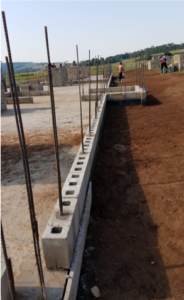 The slab has been poured for Twegashe School, and the walls are going up! We’re still on track to open for our first class of kindergartners in January.
The slab has been poured for Twegashe School, and the walls are going up! We’re still on track to open for our first class of kindergartners in January.
You’re invited to celebrate this progress with us. We’re having a fundraiser at Urban Family Brewing in Magnolia on Saturday, November 2, from 4-10 pm. We’re billing it “Brews for Bricks” since one dollar of every pint sold will go to support Twegashe School, and one dollar is almost exactly the cost of a single building block for the school. We need something like 50,000 blocks, so come have a beer at Urban Family and help us get there. As the Swahili proverb goes, “Haba na haba hujaza kibaba (drop by drop fills the jug)” or in this case, “block by block builds the wall!”
Urban Family Brewing is kid and dog friendly. Bai Tong on Wheels (Thai food) will be there that evening until 8 pm.
We hope you’ll come join us to have a beer, enjoy good conversation, and support Twegashe School all at the same time. We’d love to see you there!
—Jeannette Banobi
Find more opportunities to serve others:
September 2019 CORE Tanzania Update
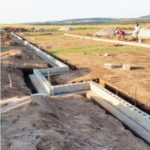 Construction of Twegashe School is moving ahead! Foundations for the main school building and teachers’ duplex have been poured and blocks are being laid for the stem walls. We had our first visit from the government building inspectors last week after the foundations were completed. The inspectors were very interested in the style of reinforced construction that we are using. Michael asked at what stage they wanted to come next to inspect, and they said they want to come right before we pour the slab—not for the purpose of making sure that we are doing things correctly, but so that they can learn new building techniques… So teaching and learning are already happening at Twegashe School!
Construction of Twegashe School is moving ahead! Foundations for the main school building and teachers’ duplex have been poured and blocks are being laid for the stem walls. We had our first visit from the government building inspectors last week after the foundations were completed. The inspectors were very interested in the style of reinforced construction that we are using. Michael asked at what stage they wanted to come next to inspect, and they said they want to come right before we pour the slab—not for the purpose of making sure that we are doing things correctly, but so that they can learn new building techniques… So teaching and learning are already happening at Twegashe School!
A huge “thank you” to our Queen Anne Lutheran Church friends and supporters for helping to make this progress possible!
—Jeannette Banobi
June 2019 CORE Tanzania Twegashe School Update
You may notice that it’s only me up front in the “Banobi” pew these days. I recently returned from three weeks in Bushasha Village, but Michael stayed behind to make sure progress on Twegashe School keeps moving forward. He and our volunteer builder, Bill Suhr, will be in Tanzania for most of the next six months overseeing the construction process.
Things definitely are moving forward. As you can see, we’ve got a storage shed on the school site now to keep construction materials secure and dry. One of the items currently housed in this shed is our machine for making compressed stabilized earth bricks. We also now have a working well onsite, powered for the time being with a generator until we find the right supplier for a solar power system.
Having a water supply means we can soon begin the brick-making process. Our crew of village laborers is currently leveling the building pads; once they begin digging for foundations we’ll use some of that excavated soil for making bricks.
 The weather posed a challenge during the three weeks I was in the village. An unusually late end to the rainy season meant heavy rain almost every day, to the extent that the road into the village became almost impassable. This made trips to town to purchase supplies or visit government offices a lot more time-consuming. But the bright side of all the rain was that it gave us an opportunity to see, before beginning construction, exactly where drainage issues are on the school site, so we can now mitigate those issues. (The other bright side of the rain, for the younger set, was an opportunity to build dams in the pathway that runs next to our house, which had turned into a swift-running stream!)
The weather posed a challenge during the three weeks I was in the village. An unusually late end to the rainy season meant heavy rain almost every day, to the extent that the road into the village became almost impassable. This made trips to town to purchase supplies or visit government offices a lot more time-consuming. But the bright side of all the rain was that it gave us an opportunity to see, before beginning construction, exactly where drainage issues are on the school site, so we can now mitigate those issues. (The other bright side of the rain, for the younger set, was an opportunity to build dams in the pathway that runs next to our house, which had turned into a swift-running stream!)
I’d like to close with a brief story about a girl named Mariam who visited our house when we were in Bushasha last year. She was fourteen years old and had just completed Standard 7 (the last year of primary school). She was a delightful girl, very curious and eager to learn from the books we had brought along. Mariam was waiting to find out the results of the national exam she had recently taken, and told us in confidence that she thought she had done well.
When we returned this year we expected to find Mariam enrolled in secondary school. But when we asked about her situation we were told that she had not done well enough to get into secondary school. Worse than that, she was already married. Still just a child, but soon to start raising a family of her own.
There’s no certainty that a different kind of education, at a school like Twegashe Primary School, with small class sizes and proper resources, would have meant a different ending to this story. But we’re convinced Mariam’s chances would have been a lot better.
Thank you so much for your interest, encouragement, and support of our effort to give more kids a chance!
—Jeannette Banobi
April 2019 CORE Tanzania Update
We’re happy to report continued progress on our Twegashe School program.
First, a huge “Thank you” to the QALC Women for their generous donation of $3,000. We feel very blessed to have your support!
We’ve made it through another government hoop, with the formation of a local NGO in Tanzania to carry out our activities there. We have word from our Tanzanian architect that the building permit should be ready by the beginning of May. The block press that we’ve purchased has made its way from India to Bushasha Village, and our volunteer builder has completed a week-long training in Dallas on using this machine and on building with compressed earth blocks. Our well has been drilled, and a pump is on order, so we’ll have water on site when we’re ready to start making blocks.
There’s still one more government application to complete, but Michael needs to be in-country for us to begin that step. We’ll be heading to Bushasha on May 11 to make preparations for construction, and that application will be our first item of business. Michael will be staying in Tanzania for an extended time to oversee the project, and our volunteer builder will arrive in late May, assuming all goes well with his residence permit application. If we haven’t received permission by that time to actually start building, there will be plenty of work to do making blocks—our calculation is that for Phase I construction we’ll need about 60,000 of them!
Lots of blocks required, and of course, lots of funds, too! We’ve raised enough to start, but there’s still a gap to close for funding the entire Phase I project. We are so thankful for all the support we have already received from our Queen Anne friends. If you have suggestions of people or groups we could reach out to (or that you could reach out to on our behalf) to leverage that support, we would be very grateful for your input.
Thank you for standing behind us in this effort to bring meaningful education to children in rural Tanzania.
—Michael and Jeannette Banobi
March 2019 Twegashe School Progress Report
We’re excited to report that lots of pieces have been falling into place recently in our preparations to build Twegashe School!
Drawings
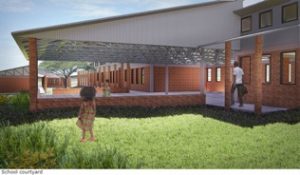 Our dedicated team of volunteer architects from Gensler, led by Queen Anne member Marc Oplinger, reached a milestone at the end of January—they’ve completed the drawings for the school and teacher’s houses to the level of detail needed to apply for a building permit. The software the Gensler team is using allows for some wonderful 3-D renderings, which means it no longer takes quite as much power of imagination for us to envision this new school in the village!
Our dedicated team of volunteer architects from Gensler, led by Queen Anne member Marc Oplinger, reached a milestone at the end of January—they’ve completed the drawings for the school and teacher’s houses to the level of detail needed to apply for a building permit. The software the Gensler team is using allows for some wonderful 3-D renderings, which means it no longer takes quite as much power of imagination for us to envision this new school in the village!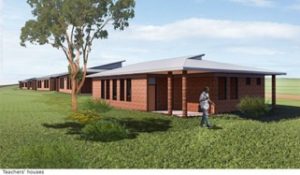
Land
The other important piece that had the potential to hold us up was land ownership, since in addition to drawings we also need proof of land ownership to apply for a building permit. The village voted back in June 2017 to donate land for the school, and for the entire year and a half since then we have been working with the village through the many and complicated government processes required to make our land ownership official. The persistence paid off—on February 15 we received an email indicating that our certificate of land ownership has been issued. We’ve sent a copy of this certificate and the school drawings to our Tanzanian architect, and he is now working on the permit application. He expects that process to take about a month—one of the very few processes that might actually be faster in Tanzania than in Seattle!
Building blocks
Because we learned on our recent trip to the village that the soil on the school site is of good quality for making compressed stabilized soil blocks, we’re moving ahead with our plans to use this type of block for our construction project. We’ve ordered the Auram 3000 block press (purchased through the generosity of a Queen Anne member) to be shipped to Bukoba, where we expect it to arrive by mid-May. Our volunteer construction supervisor, Bill Suhr, has signed up for a five-day hands-on training in Texas to learn how to make and build with these blocks. He wants to be sure that he is very well-versed in this new technology before beginning the construction project, so that he can not only build successfully with these blocks but also transfer skills to village block-makers and masons.
We’re very excited to be able to use these environmentally-friendly building blocks that won’t require wood to be burned for their firing. Our project manager, Mike Tully, estimates that we will need roughly 60,000 blocks for our Phase I building project—that would be a lot of firewood! Another beauty of the compressed soil blocks is that two of the three component materials, soil and sand, are available locally. We will use the soil as we excavate for construction, and sand is available on village land just below our site. The only item we’ll need to have delivered from town is cement, and the cement content for these blocks is only 8-10%, so this will save a lot of transporting!
Curriculum
While construction preparations seem to consume most of our attention, work on curriculum continues, ably led by retired elementary teacher and Queen Anne friend Steven Burdick. Steven’s team has completed a detailed kindergarten curriculum, incorporating all elements of the required Tanzanian curriculum and adding extensive enrichment. They have also selected some curriculum materials (provided by donation from committee members) and gathered a wonderful collection of donated picture books, carefully selected to be culturally appropriate. They are creating a resource of suggested activities particularly in the area of literacy that can be used to involve parents and community members in their children’s education. As mentioned in a previous update, committee member Keela Williams has donated a fabulous collection of Montessori materials from the school she used to run. She plans to spend a month in Tanzania before school opens to train our teachers in using these materials. The curriculum committee’s newest project is preparing a job description that we can use when we begin the very important task of recruiting Twegashe School’s first teachers.
The recent progress in our preparations for construction—particularly the completion of the permit drawings and obtaining title to the land—means that absent any big surprises we expect to be able to begin construction on Twegashe School in late May 2019. Yes, that’s May of THIS YEAR, only three months away!
There’s still a lot to be done, including, of course, more fundraising. We’ve raised over $200,000 so far toward our target of $500,000 for the entire Phase I (through 2022) construction and operation costs. We know that our goal to improve education and revitalize an entire community is ambitious, but “Not Crazy,” as Peggy Sturdivant titled her recent Westside Seattle article about CORE Tanzania. Not crazy, because the need is so great.
Thank you to our many friends at Queen Anne Lutheran for joining us in trying to help meet this need. We are so grateful for your encouragement, your prayers, and your support.
Asante sana!
Michael and Jeannette Banobi
P.S. A new way to support CORE Tanzania
We’ve recently been approved as a participating charitable organization in the Thrivent Choice program. Through this program you can direct Thrivent Choice Dollars to CORE Tanzania if you are an eligible Thrivent member. You can also make a personal donation online to CORE Tanzania, whether or not you are a Thrivent member, and Thrivent will cover all of the processing fees so that 100% of your donation goes to support education in rural Tanzania. The Thrivent platform is simple to use—you can find all the information you need on their Thrivent Choice webpage. Thank you to Thrivent for this generous program!
December 2018 Twegashe School Progress Report
School Design
In late May we had a changing of the guard on our design team. We’re grateful to the volunteers from NAC for setting us off on the right path. Our friend and long-time Queen Anne Lutheran member Marc Oplinger has stepped in to lead the design process. Marc is a senior project manager at Gensler, and through the G-Serve program at his firm he was able to recruit two other volunteers to help with the architectural drawings. Because of Marc’s commitment, progress has continued without interruption. Marc was also able to enlist the help of a few engineers at Swenson Say Faget structural engineering to review the designs and ensure they are structurally sound.
Curriculum
We’ve also made a good start on curriculum design over the past six months. We’ve gathered an enthusiastic and experienced committee that includes a retired elementary school teacher, a retired special education teacher, a former middle school science teacher, a former ESL teacher, and a retired Montessori teacher/school director. We’ve begun working with the Tanzanian government kindergarten curriculum, deciding on the best order for introducing skills and concepts, looking for areas where we should provide enrichment, and brainstorming possible learning activities. We were thrilled to find out that committee member Keela Williams has a treasure trove of learning materials from her Montessori school that she’s been saving for just this sort of opportunity. On our recent trip to Tanzania we filled almost all of our suitcases with things like counting squares, beads, sandpaper letters, picture books, and puzzles instead of clothes!
Trip to Tanzania
Speaking of that trip…In mid-September we headed to Tanzania for a three-week stay in the village. Our volunteer builder, Bill Suhr, once again joined us, as did our volunteer project manager, Mike Tully. Our daughter Catherine also came along and served as team photographer. We had a long “wish list” of items to accomplish on this trip, and, remarkably, we were able to complete most of them!
Building a road to access the school site was one of our primary tasks since a road will be essential to bring in construction materials. In keeping with our aim of employing local labor as much as possible, we hired six young men from the village to help with this project.
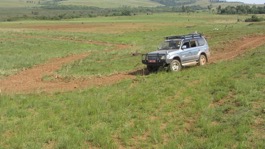
Bill compacting the newly cleared road with our rented Land Cruiser
The road-building began with plotting the best course to minimize erosion and avoid occasional boulders. We marked out roughly 600 meters of roadway with stakes and pink flagging so our hired road crew could see their task clearly. After they cleared the grass and leveled the road surface, Bill used our rented Land Cruiser as a compacter, driving up and down the road to firm down the soil and prepare the surface for graveling.

Village road crew spreading gravel
We ordered 38 truckloads of gravel, which were delivered over the course of two days. These trucks didn’t have the capability to spread the loads evenly, so our road crew did the spreading, with shovels, wheelbarrows, and rakes. The final step in road-building was digging deep drainage ditches on the uphill side of the road to channel water away from the road surface.
The Tanzanian government requires every rural school, even primary schools, to have a full-size soccer field. We couldn’t start any actual construction on this trip since we don’t have a permit yet, so we decided to get started on the soccer field instead. There are no government specifications about the quality of school soccer fields, but given the high proportion of soccer fans among CORE Tanzania’s supporters (and in the Banobi family!), it went without saying that Twegashe School’s soccer field would be of high quality! This meant the field would need to be leveled to a slope of roughly three percent. After staking out a rectangle on the flattest portion of our property, we used Bill’s laser level and story pole to measure elevations. We then placed stakes around the field with blue tape marking the height to which dirt would have to be removed or piled up to achieve this goal. On the low side, our blue tape was about two feet above ground level. On the high side, we had to dig a hole two feet deep and put the tape on the bottom of a stake inside that hole. This leveling was clearly going to be a formidable task!
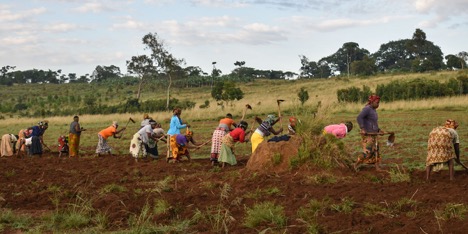
Village women hoeing to clear and level the soccer field
Who else to undertake such a task but the village women’s “co-operative”? We met at the school site with their chairwoman and the forty women she had recruited (ten from each of the four village sub-units) to explain the task and negotiate a price. The final price, while it would allow a decent wage for the women by village standards, turned out to be considerably less than we would have paid to bring in a bulldozer from town to level the field.
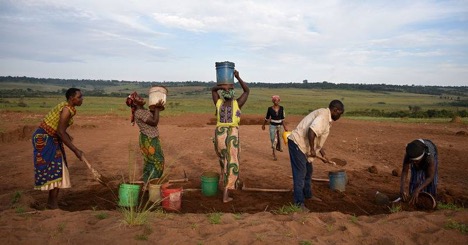
Village women moving dirt to level the soccer field
For the remaining week and a half that we were in the village, the women were out there on the soccer field moving dirt every morning from about 6 a.m. until 11 a.m. When they began the work, we suggested that wheelbarrows might make the task easier, but they resisted. But after a day or two they asked to try a wheelbarrow, and they were hooked. In fact, we had to buy a few more so there would be one for each of their four sub-groups. When we left Bushasha to return to Seattle the leveling task was about one-third completed. The plan is for the work to continue in our absence, so we should be able to try out the field next time we return. The women have requested that a soccer game between their women’s groups be a featured event at the opening of Twegashe School!
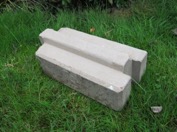
Sample brick made with soil from the school site
Another goal for the trip was to have our soil tested to make sure it’s suitable for making compressed stabilized soil blocks (CSEBs). Over the past year or so we’ve been in correspondence with an organization called Good Earth Technology (Tanzania) that promotes the use of CSEBs. They have a representative in the Bukoba area, Josue Joseph, who has the required equipment for soil testing, and we had made arrangements with him to test our soil during this visit. Josue met us at the school site to collect a soil sample soon after we arrived in the village. He left with several cubic feet of soil, and contacted us two weeks later with the good news that our soil worked well for making CSEBs. He even met us in town to give us the sample blocks he had made with our soil. They looked great, and Bill said they passed the fingernail scratch test!
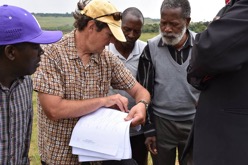
Our volunteer builder conferring with the Tanzanian architect
During this visit we met several times with Samson Lugaisa, the Tanzanian architect who will be submitting our plans to the District to obtain a building permit. We were happy to hear that if we employ Mr. Lugaisa he will take care of all aspects of the building permit application process from here on out, including navigating the multiple layers of bureaucracy. Mr. Lugaisa comes very highly recommended from a variety of sources, so we feel like we will be in good hands.
We were also pleased to hear from Mr. Lugaisa that the microflush biofil toilets we are planning to use are already familiar to the building department, so we shouldn’t have any trouble getting approval to use these toilets. Encouraged by this good news, we made a visit to the village infirmary to ask if they might be interested in having us build a sample toilet at their facility. (The GSAP organization that is supplying the technical know-how for the toilets requires that we begin with a “sample” toilet as training for local toilet maker, who will then build our school toilets independently.) The medic at the infirmary was delighted with this offer. He said they have wished for quite some time to improve toilet facilities for their maternity patients, but haven’t been able to raise sufficient funds.
Another area where we made significant progress during this trip was in obtaining official title to the land where Twegashe School will be built. We were able to facilitate delivery of some important paperwork from the village to the district government, and on a follow-up visit we learned that the district director had approved the transfer so all that remained was to have the land surveyed. We commissioned two surveyors, and on Friday afternoon, the day before we left Tanzania, they came to the school site to install cement cornerstones. They said they would begin the survey the next day, but it would take quite some time, since the nearest surveyed point was a long way from Bushasha, on the road leading into town. As soon as that survey is complete, we will be given official title to the land.
Amidst all these construction-related tasks, we did manage to find time to research curriculum questions as well. In particular, we spent several hours at a private English-medium school close to the town of Bukoba, touring the school, observing a kindergarten math lesson, and speaking in some depth with the kindergarten teacher. We were heartened to see five-year-olds at this school enthusiastically participating in a discussion carried out entirely in English. We were also heartened to hear from the teacher that it should be possible for us to find teachers trained as she is to teach young children and also very comfortable using English. She said that although the search may require some effort, such teachers are available. We suggested that we might be back in touch, asking her for leads when we are ready to start hiring!
Well-Drilling
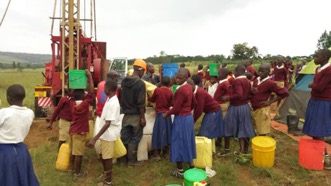
Students from the existing primary school delivering water for the well-drilling process
Preparations for Twegashe School continued in the village even after we left Tanzania. In mid-October the drilling crew from the organization that offered to drill the well for us arrived in Bushasha with their rig. The drilling operation requires a water source, so the village chairman recruited students from the existing primary school to fill the crew’s water storage tank. The drilling crew’s custom is to camp on-site to ensure the security of their equipment. They pitched their tent on the road we built to access the school—covered in gravel, but at least it’s level ground!
We received word a week or two later that the drilling crew had hit water at about 140 feet. But they had plans to continue drilling farther to be certain the water supply will be consistent. When the drilling is completed, they will install a casing and seal the borehole until we are ready to install a pump.
If you’d like to know more about CORE Tanzania and about our plans for Twegashe School, you can visit our website at www.coretanzania.org. We’re on Facebook, too—click here [https://www.facebook.com/coretanzania/] to link to our Facebook page. We would love if you would help us spread the word!
Thank you very much for your support. Having so many of you at Queen Anne Lutheran behind us in this effort really means a lot!
Asante sana! (Thank you very much!)
Michael and Jeannette Banobi
CORE Tanzania School Progress Report – January 2018
We’re continuing to move forward in our preparations to build Twegashe (Twĕ-ga՛-shĕ) Primary School!
Much of our time and energy last fall was spent in planning for construction. We had several meetings with the volunteer architects from NAC Architecture who are helping us pro bono on this project. We were impressed with the research they have done into the culture of Michael’s tribe as they strive for a design that reflects this local culture. They’ve produced drawings of several possible school layouts, and will soon move into the building design phase. Marc Oplinger, an architect and long-time Queen Anne member, is also an active participant on the design team. Thank you, Marc!
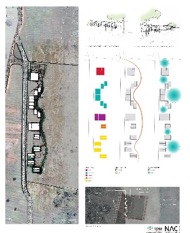
We were very fortunate to have a friend of ours, Bill Suhr, who is a trained architect and professional builder, volunteer to spend an extended time in Tanzania supervising our construction project. We will be traveling to Tanzania for two weeks with Bill in early February to gather construction information. We’ll be visiting several schools across the northern part of Tanzania to look at their facilities and observe their construction methods. Bill also wants to get a grasp of what sort of construction materials are available locally. While we’re in the village, we’ll be taking more precise measurements on the plot of land we have been given by the villagers. This will help the architects to determine the optimum positioning of the school buildings.
We recently made a breakthrough in determining what latrine technology to use at Twegashe School. It’s been surprisingly hard to find a safe, economical, culturally appropriate, and environmentally friendly latrine, but we think we finally have the answer! It’s called a microflush biofil toilet, and it uses common worms to digest the waste into a compost that’s perfectly safe to handle. The professor who designed this toilet is connected with an organization called the Global Sustainable Aid Project. Their model is to train local toilet “makers” who can then set up a small business providing toilets to their community. The professor offered to train Bill in constructing these toilets. Bill will then train a local maker to build toilets for our school, and perhaps for other residents in the village as well.
Our other big focus in the past few months has been getting started on fundraising. We’ll soon be publicly launching a campaign to raise $500,000–enough to build Phase I of the school and teachers’ housing and operate the school for three years. To date we have raised $105,000 in donations and pledges. A huge thank you to those of you who have contributed to this encouraging start! We’re still waiting for the IRS to approve our 501(c)3 status (there’s a 90% chance we’ll have this by early February, according to the IRS agent we spoke to a few weeks ago), but if you’d like to help us right now in moving toward our fundraising goal you can make a tax-deductible donation to Queen Anne Lutheran Church and just designate “CORE Tanzania” in the memo line. (Please note that since offerings are confidential, we won’t be able to acknowledge your gift unless you let us know you’ve donated!)
In an effort to spread the word about our project we’ve been reaching out to a few local schools, and this approach has borne fruit. The director of global education at Lakeside School is interested in including our school as one of the sites their students can choose from for their month-long service learning experience abroad. Students would be able to help with school construction in 2019 and in future years they would work with students at the school. On top of this, a group of current Lakeside students who spent time in Tanzania in previous years have volunteered to create a crowd-funding campaign to support our project. We’re very happy to have some assistance from the younger generation, especially in the social media arena!
If you’d like to know more about CORE Tanzania and about our plans for Twegashe School, you can visit our website at www.coretanzania.org. We’re on Facebook, too—link to our page here. We would love if you would help us spread the word!
Thank you very much for your support. Having so many of you at Queen Anne Lutheran behind us in this effort really means a lot!
Asante sana! (Thank you very much!)
Jeannette and Michael Banobi
Contact us directly at
jalmbanobi@gmail.com
